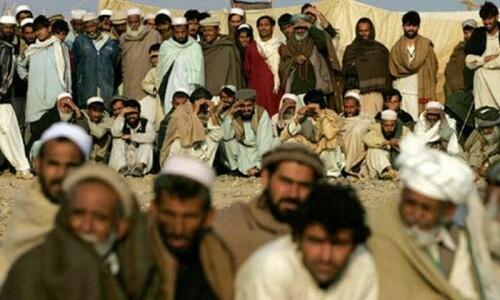LAHORE: Another member of the Ahmadi community — this time a woman, a retired assistant professor of molecular genetics at Punjab University — was found murdered in her house on Tuesday.
Tahira Malik was found dead at her residence on the premises of the university. Her throat had been slit.
Saleemuddin, spokesperson for the Jamaat-i-Ahmadiyya Pakistan, told Dawn that Prof Malik was Ahmadi. “We are trying to determine whether she was targeted because of her faith.”
He said her daughter had been trying to get in touch with her but her phone had been switched off. “She alerted someone at the varsity who, along with police, broke into the house and found Prof Malik in a pool of blood,” Mr Saleemuddin said.
Police authorities, however, said that while they could rule out murder for resisting robbery, they could not yet term it a targeted killing.
DIG (operations) Dr Haidar Ashraf said Prof Malik had been living alone at her apartment after the death of her husband about six years ago.
Some people in the area told journalists that the television at her house was switched on when police arrived. Police are trying to get access to surveillance footage from cameras installed in front of her residence at the Punjab University’s New Campus.
An official from the Muslim Town police station told journalists that they had found Prof Malik lying in a pool of blood. There were visible signs of torture on her body.
“The motive for the gruesome killing is yet to be ascertained,” said DIG Ashraf. He, however, ruled out murder on resisting robbery, saying that all her belongings, including her money, were present at her house when she was found dead.
The DIG said her daughter had arrived in Lahore. Police will register an FIR after receiving a post-mortem report.
A Punjab University spokesperson said Prof Malik was a retired assistant professor of the Department of Microbiology and Molecular Genetics. She was working at the department on contract after her retirement. Her daughter lived in Karachi.
The spokesperson said the university officials had not found evidence of robbery. When they reached the crime scene, the TV was still on and things at the house were in order.
He said Prof Malik had joined the PU Centre for Applied Molecular Biology in 1984 as a research scholar. She completed her MS from California University Riverside, US, in 1990.
This is the third murder of a member of the Ahmadi community in Punjab in two months.
Prof Ashfaq Ahmad, a veterinarian doctor, was shot dead in his car in the Sabzazar area of Lahore in the first week of April. The retired professor of the University of Veterinary and Animal Sciences was on his way to a place of worship with his grandson when he was killed.
A prominent lawyer from Nankana Sahib was shot dead on March 30. Advocate Malik Saleem Latif was a cousin of Nobel Laureate Dr Abdus Salam and the head of Nankana City’s Jamaat-i-Ahmadiyya.
Published in Dawn, April 19th, 2017
















































